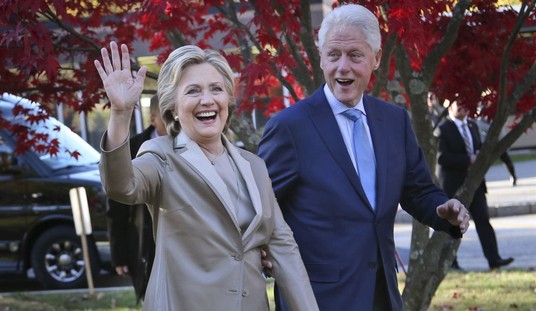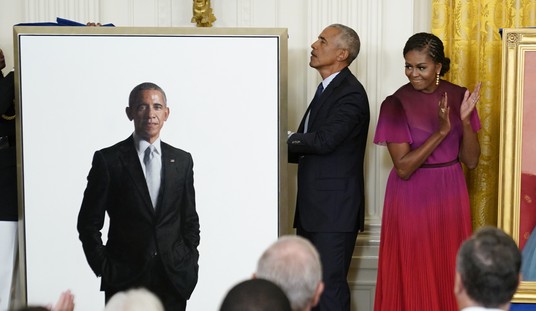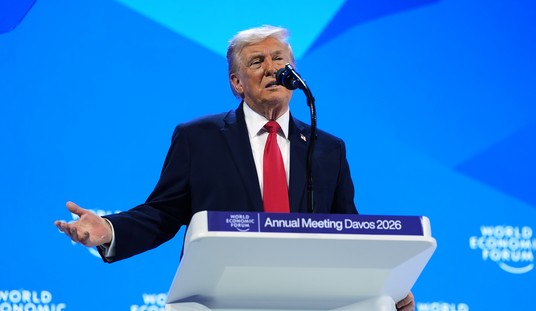In a few days President Obama will unveil his strategy to destroy ISIS to a waiting public. NBC reports “one day before the thirteenth anniversary of the September 11 attacks, President Barack Obama plans to address the nation on the threat posed by ISIS extremists — telling NBC News the U.S. will ‘hunt down’ the terrorists ‘wherever they are.’.”
While the strategic plans themselves have not been disclosed in advance, Obama “revealed his plans for the upcoming address” — the domestic political objectives of the speech — to Chuck Todd.
“What I’m going to be asking the American people to understand is, number one, this is a serious threat,” Obama said about the speech, which is not expected to be a prime time address. “Number two, we have the capacity to deal with it.”
Obama emphasized he will not advocate for the deployment of U.S. ground troops in the region, saying it would be “a profound mistake” to put American boots on the ground in Syria as some critics have suggested.
However the basic outlines of the strategy itself have emerged from information already available to the press. A Los Angeles Times story suggests that Obama will rely on proxies to fight ISIS at three levels: on the ground, within the region and in the West. Kerry invokes comparisons to the Sunni Awakening, seeking to recall the days when al-Qaeda in Iraq was beaten by George W. Bush. Obama plans to organize the Sunni Arabs to fight ISIS.
“We are going to have to find effective partners on the ground to push back against ISIL,” Obama said. “And the moderate coalition there is one that we can work with. We have experienced working with many of them. They have been to some degree outgunned and outmanned, and that’s why it’s important for us to work with our friends and allies to support them more effectively.” …
“It is absolutely critical that we have Arab states, and specifically Sunni-majority states, that are rejecting the kind of extremist nihilism that we’re seeing out of ISIL, that say, ‘That is not what Islam is about,’ and are prepared to join us actively in the fight,” Obama said, using one of the acronyms for Islamic State.
Secretary of State John F. Kerry and Defense Secretary Chuck Hagel are to fly to the Middle East in coming days to line up regional partners, a push for a Middle Eastern coalition that recalled the Sunni Awakening movement a decade ago that brought some stabilization to Iraq during the war there.
At the top level of the coalition are a “group of allies — Britain, Australia, Canada, Denmark, France, Germany, Italy, Poland and Turkey” — chaired, presumably, by Obama himself. Somewhere in the middle are the regional allies. At the lowest level will be a hodgepodge of fighters, of which the battle for Amerli was typical. The Washington Post wrote of that battle,
The Obama administration’s strategy in Iraq is predicated on the country’s competing militia groups, as well as its battered army, setting aside their differences over territory, ethnicity and religion to form a grand coalition to battle the radical Sunni members of Islamic State. The aftermath of the fighting in Amerli shows how quickly this hodgepodge of militia forces can turn on each other as they fight for influence and the spoils of battle.
The road to Amerli also offers a glimpse of how the last few months of fighting have destroyed virtually every vestige of the Iraqi state in the north. After being turned away from Amerli, the pesh merga fighters returned to their base, just three miles away, passing through a half-dozen other Shiite militia checkpoints. Some belonged to the Badr Brigades, others to Saraya al-Salam and Asaib Ahl al-Haq. All were vying for influence in the area. Each flew their own militia flag; the Iraqi flag was nowhere to be seen.
Similar motleys will receive intelligence and fire support from U.S. assets across the battlefield. Presumably, they will receive political legitimacy from the regional Sunni powers (at least some of them). Kerry has been lobbying the Arab League to clamp down on the jihadi flows. “U.S. Secretary of State John Kerry spoke with Elaraby by telephone Saturday to discuss the need for the Arab League members to take a strong position in the coalition that is being put together to confront the militants, including measures to stop the flow of foreign fighters, clamp down on its financing and to combat its ideology.”
At the same time, Obama has not forgotten the Shia. He’s bringing them into into the battlefield as well. Amerli saw U.S. airpower used in support of Iranian-controlled groups. The Economist says:
Fighters from the Shi’ite Badr Brigade militia stand near their flag as they guard at a checkpoint along a highway recently taken from militants of the Islamic State, outside the town of Sulaiman Pek September 5, 2014.
The war against ISIS brings unsavoury allies …
The myriad Shia fighting groups are linked either to Iran’s powerful clandestine arm, the al-Quds organisation of Iran’s Revolutionary Guard; or to the Iraqi Shia cleric, Muqtada al-Sadr; or to factions of the Shia-dominated government. They expanded rapidly after America’s invasion of Iraq in 2003 and were believed to run death squads during the sectarian war in 2006-07. Most of these fighters later put down their weapons, but the rise of IS has prompted a surge in new recruits.
At least four Shia militias took part in the battle for Amerli: the Badr Corps, set up in the 1980s by Iran to challenge the Iraqi regime of Saddam Hussein; Asaib Ahl al-Haq, which is popular among new recruits because of its audacity and cruelty; Kataib Hizbullah (not directly related to Lebanon’s group of the same name), a well-trained outfit linked to Iran; and Saraya al-Salam, a rebranded version of Mr Sadr’s Mahdi army, which was formally disbanded in 2008. Smaller militias of 100-150 men have popped up since June, when Ali al-Sistani, Iraq’s highest Shia authority, urged men to volunteer (for the army, not militias) to defend Baghdad after IS took Mosul, Iraq’s second biggest city.
If the West wants to counter IS, it may have no choice but to co-operate, explicitly or implicitly, with such Shia fighters.
Not everyone thinks this is a good idea. One person who thinks he sees a developing train wreck is Henry Kissinger. He thinks Iran will be a bigger problem than ISIS. They may well wind up the winning in this billiard break.
There has come into being a kind of a Shia belt from Tehran through Baghdad to Beirut. And this gives Iran the opportunity to reconstruct the ancient Persian Empire — this time under the Shia label — in the rebuilding of the Middle East that will inevitably have to take place when the new international borders [are] drawn. Because the borders of the settlement of 1919-’20 are essentially collapsing.
That gives Iran a very powerful level from a strategic point of view. I consider Iran a bigger problem than ISIS. ISIS is a group of adventurers with a very aggressive ideology. But they have to conquer more and more territory before they can became a strategic, permanent reality. I think a conflict with ISIS — important as it is — is more manageable than a confrontation with Iran.
My own view on the matter can be summarized in a word: Libya. Libya on a gigantic scale.
The major danger facing the Obama administration is that this vast, Rube Goldberg coalition will malfunction and get away from them. There will be friction between the Sunni parts, and sparks between the Sunni and Shia components, and gasoline all around. Once your allies on the ground start fighting among themselves, whom do you bomb? The worst-case scenario here is that Obama will wind up spreading the trouble to Turkey and Saudi Arabia.
A really comprehensive solution to the problem of ISIS would have three parts. The first is a program of energy independence, involving clean nuclear energy over the long term and hydrocarbon development in the short term to weaken the power of the Sunni states, Iran and Russia. Under this broad heading is the development of food reserves and water desalination technology. These will be the major sticks — and carrots — of the coming years.
The second is securing Western borders against the inflow of immigration from countries in which these Islamic supremacist doctrines are being preached and the dismantling of all unsustainable welfare systems in order to revitalize economic competitiveness. The West must become the West again.
The third is an orderly withdrawal from Afghanistan accompanied by a significant increase in defense spending, to constitute an effective global strategic reserve whose main role will be to engage in unrestrained, but economy-of-force actions to thwart ISIS, Iran and al-Qaeda on an individual and American-led basis. No more leading from behind or someone will f**t in your face.
The idea behind these three principles is simple. The West can only win by unleashing its economic and social potential. That is the sword. America wins by out-logging its foes who are busy fighting.
As for the Middle East, the West should help them resolve conflicts where it can. But it is beyond the competence of the West — and indeed Obama’s — to bring about a solution to the Islamic civil war or reform Islam itself. It can help in the resolution of this crisis, but only if it retains freedom of action, and only if it is not clamped to a coalition that will only drag everything down into a morass.
None of these three concepts are highlighted prominently in Obama’s reported strategic cogitations. Indeed, they are calculating events along another model. But I will wager that these 3 principles will yet emerge before the end.
Recently purchased by readers:
Captain America: The First Avenger, (Two-Disc Blu-ray/DVD Combo + Digital Copy)
Sleepy Hollow Season 1 [Blu-ray], a British spy working with George Washington against a Headless Horseman who sets the stage for the Apocalypse
The Raven Boys, a supernatural thriller
Quantum: Einstein, Bohr, and the Great Debate about the Nature of Reality, Einstein’s belief in objective reality pits him against the daringly agnostic Bohr
The Shining, Steven King shows why he is the king of scary
Recommended:
Visual Storytelling with D3, a graphics library for Javascript.
Traction: A Startup Guide to Getting Customers, how not to fail as a startup
American Weigh Scales GEMINI-20 Portable MilliGram Scale, Weighs up to 20 grams in 0.001 gram increments
Timex Unisex T2P1429J “Weekender” Watch, Round silver-tone watch with 24-hour time on inner dial and woven nylon band with contrast stripe
eBags Packing Cubes, keep stuff separate in your pack
OontZ Curve Super Portable Wireless Bluetooth Speaker, up to 5 hours of play time from the rechargeable lithium-ion battery
Did you know that you can purchase some of these books and pamphlets by Richard Fernandez and share them with you friends? They will receive a link in their email and it will automatically give them access to a Kindle reader on their smartphone, computer or even as a web-readable document.
The War of the Words for $3.99, Understanding the crisis of the early 21st century in terms of information corruption in the financial, security and political spheres
Rebranding Christianity for $3.99, or why the truth shall make you free
The Three Conjectures at Amazon Kindle for $1.99, reflections on terrorism and the nuclear age
Storming the Castle at Amazon Kindle for $3.99, why government should get small
No Way In at Amazon Kindle $8.95, print $9.99. Fiction. A flight into peril, flashbacks to underground action.
Storm Over the South China Sea $0.99, how China is restarting history in the Pacific
Tip Jar or Subscribe or Unsubscribe to the Belmont Club










Join the conversation as a VIP Member